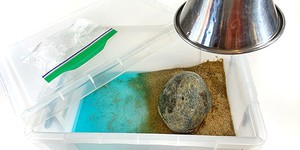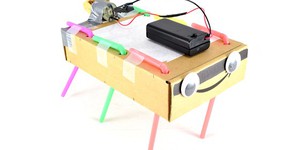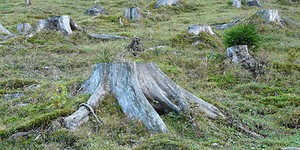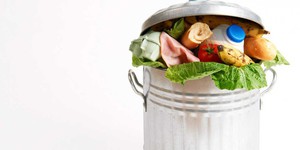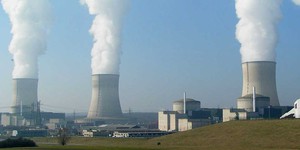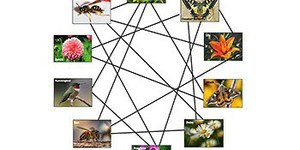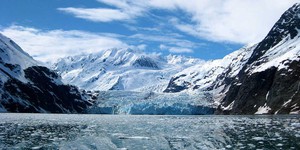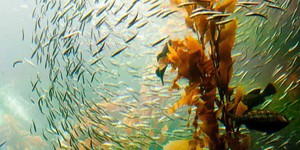Environmental Science Lesson Plans (20 results)
As humans we are part of the environment. With over 7.5 billion of us on Earth, our combined actions also have a big impact on the environment. As long as we are aware of the impact, we can do things as individuals, and working together as groups, to lessen the detrimental impact of billions of people. Explore important topics like air quality, water quality, the effects of climate change, and many others to make informed decisions about caring for our planet.
|
Select a resource
Sort by
|
Lesson Plan
Grade: 6th-8th
7 reviews
Earth is a planet full of water. 70% of its surface is covered with water in oceans, lakes, rivers, and more. Water on our planet can also be found in the atmosphere and underground. In this lesson, students will explore how water is continually cycled among land, the oceans, and the atmosphere. As students build a physical model of the water cycle, they will be able to simulate and observe evaporation, condensation, precipitation, and other water cycle processes in real-time.
Remote…
Read more
NGSS Performance Expectations:
Featured
Lesson Plan
Grade: 6th-8th
7 reviews
Junkbots are easy-to-build robots that you can make using a simple circuit and some recyclable materials. In this lesson, your students will learn about engineering design as they compete to build the fastest robot. No previous robotics experience is required!
Read more
NGSS Performance Expectations:
Lesson Plan
Grade: 6th-8th
3 reviews
Global warming, pollution, and deforestation are just a few examples of how human actions affect our planet. How can we reduce our impact on the environment? In this lesson, students will find out by using an online tool called
Your Plan, Your Planet.
Based on their findings, students will come up with their own action plans aimed at reducing their personal ecological footprint and assess its effectiveness after implementation.
Read more
NGSS Performance Expectations:
Lesson Plan
Grade: 4th-8th
3 reviews
The problems with using fossil fuels starts with extraction. In this activity, students "mine" chocolate chips out of cookies to demonstrate the effects mining can have on habitats.
Read more
NGSS Performance Expectations:
Lesson Plan
Grade: 5th
4 reviews
How do our everyday actions contribute to our ecological footprint? Can we change our individual actions to be more environmentally friendly and create a more sustainable lifestyle? In this lesson, students will evaluate their own environmental impact using an online tool called
Your Plan, Your Planet,
and evaluate simple ways to reduce their ecological footprint as an individual or community.
Read more
NGSS Performance Expectations:
Lesson Plan
Grade: 6th-8th
2 reviews
Forests are the green lung of the Earth and home to millions of different plant, fungi, animal, and bacteria species. Unfortunately, today many forests are threatened by deforestation, which causes significant biodiversity loss. Ongoing reforestation efforts across the world intend to counteract the effects of deforestation. As planting trees by hand does not scale well, machines on the ground, as well as flying drones have been developed to help plant tree seedlings or seeds. In this lesson,…
Read more
NGSS Performance Expectations:
New
Lesson Plan
Grade: 6th-12th
Create a two-part system for filtering greywater. Teams will focus on communication and systems engineering as they build separate components to filter solid and liquid waste and then combine them into one device.
Learning Objectives
Students will:
Consider the potential effects of drought and how greywater could be part of the solution.
Design a system for filtering out solid waste or liquid waste.
Consider effective communication strategies with their team.
Collaborate on their design…
Read more
Lesson Plan
Grade: 3rd-11th
4 reviews
Have you ever thrown away food after a meal? Have you ever thrown away a whole piece of food? What are some of the reasons you threw away that food?
During this Food Waste Audit, students will explore their own impact on our food system. Students will brainstorm solutions to reduce their food waste and be challenged to try out their solution!
Read more
NGSS Performance Expectations:
Lesson Plan
Grade: 4th-8th
In these two activities, students will explore two consequences of burning fossil fuels: air pollution and the greenhouse effect. For a comprehensive unit on fossil fuels, this lesson works especially well as an extension to Fossil Fuels: Chocolate Chip Mining.
Read more
NGSS Performance Expectations:
Lesson Plan
Grade: 2nd
3 reviews
Pollination and seed dispersal are both crucial processes in a plant's reproduction cycle. These processes are helped along by many factors, including different animals. For instance, some animals disperse the plant seeds, while others transfer pollen from one flower to another. In this lesson plan, students will investigate the interdependence between plants and animals for pollination and seed dispersal by creating interdependence webs out of yarn. Based on their created interdependence webs,…
Read more
NGSS Performance Expectations:
Lesson Plan
Grade: 5th-8th
1 review
Do sea levels rise when ice melts? Does it matter whether the ice is on land or in the ocean? Students design an experiment to find out. They collect data, graph their results, and interpret their findings. Along the way, they learn about density, displacement, and climate change.
Read more
NGSS Performance Expectations:
Lesson Plan
Grade: 5th-9th
2 reviews
Could you describe the kelp forest food web as a system? Your students will design and use a simple model to test cause and effect relationships or interactions concerning the functioning of a marine food web, ranking their hypothetical ecosystems according to their stability when faced with a natural or man-made disturbance.
Read more
NGSS Performance Expectations:
|
Explore Our Science Videos
DIY Rubber Band Paddle Boat
Candy Diffusion Art
How to Make Edible Rice Paper

